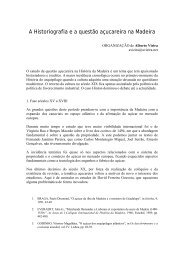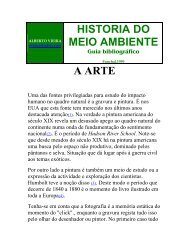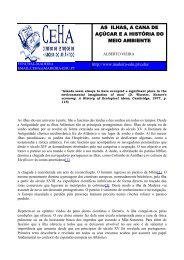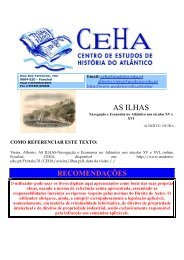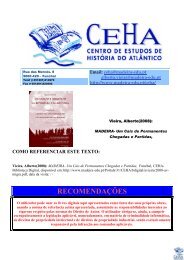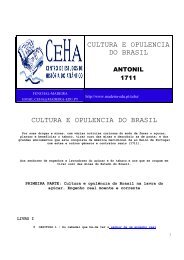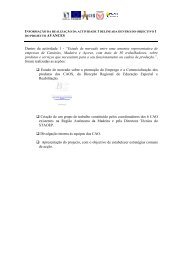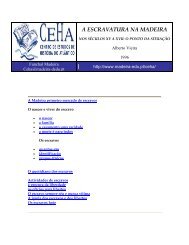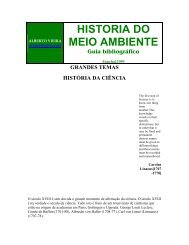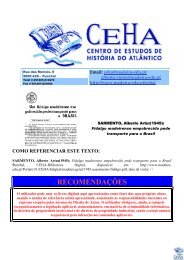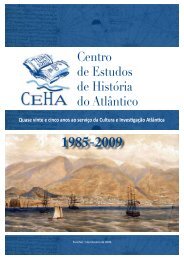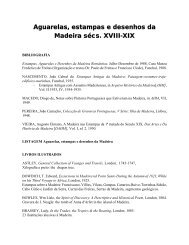SLAVERY IN MADEIRA
SLAVERY IN MADEIRA
SLAVERY IN MADEIRA
Create successful ePaper yourself
Turn your PDF publications into a flip-book with our unique Google optimized e-Paper software.
At this level, Church is faced with a dilemma: in its doctrine condemned concubinage of<br />
the slaves and free men, but in reality, confronted with the presence of one child to be<br />
baptised, ignored it, without acting against the parents, as prescribed in the Ecclesiastical<br />
Constitutions. The ones of 1585 established that sexual intercourse before marriage was<br />
condemned with the excommunication penalty. Alike, the religiousness of the slaves and<br />
freedmen, should be referred, still had other guaranteeing indicators of that: the religious<br />
charges established, by testament or mere schedule.<br />
The position assumed by slaves and freedmen towards death is, without any doubt,<br />
another sign of the religiousness of this group. The assimilation or not of the vision that<br />
Church then , disclosed of Death stays obvious through the schedules or testaments. The<br />
recourse to these documents, transcribed in the Death register or tumbled in some<br />
institution that received legates, allows such a conclusion. However, in the case of the<br />
slaves, without the necessary means to assure a celestial intercession through the mess's<br />
charges, his presence is almost null. Only on the death registers we find eight of them that<br />
established such duties, six females and two males. In any case, a testament was not<br />
done, being the last wish expressed in an outcry, while the Extreme Unction was being<br />
given.<br />
The limited number of slaves soliciting divine intercession through services cannot, by<br />
any means, be an indication of the little adhesion to the religious death ritual, but on the<br />
other hand, it is a sign of their slender means. The testaments or schedules dropped at the<br />
Hospices, "Julgado de ResÝduos" ,Churches and rarely on the Death registers, only have<br />
place when the dead slave established donations or charges of interest to these<br />
institutions. At last, the Negroes attitudes towards Death should be ruled by the traditions<br />
of the place of origin, which never coincided with the Christian ones in any way. Here,<br />
we only have freedmen and the last declarations are made by means of a schedule to the<br />
Father of Funchal's Hospice, at the time of the administration of the Sacraments. Of<br />
these, we only found nine cases, 4 females and 5 males. With those of the parochial<br />
registers the number goes up to sixty, being the majority done by females (72%). Their<br />
expression is more evident in the XVI century (64%) than in the following, which might<br />
be an indication of a greater impoverishment in this century.<br />
It should be pointed out, also, that during this period the charges are less, as only 24% of<br />
the slaves established the ones for services and 34% for the duties. In both cases, the<br />
number of slaves with messes or duties reaches 45%, being that for church services only<br />
3 slaves make up 85% of the total. On the other hand, it is evident the predominance of<br />
the females in any of the situations, having Maria das Neves standing out. From Funchal,<br />
coloured, free, with 30 services prayed. From Estreito da Calheta, there was Maria, black,<br />
with 28 church services.<br />
In all of them it is obvious the recourse to the protection of Funchal Charity Hospice and<br />
the recognition of its charitable work. The duties and charges are established in greater<br />
part, for the institution. Apart from that it should be referenced the fact that many of them<br />
claimed for the merits of the institution in wanting to be buried in the chapel and have the<br />
right to a church service.




